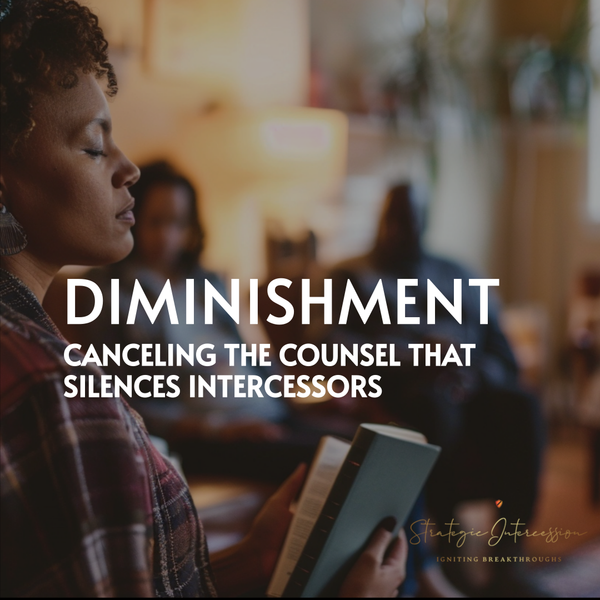Blog 17 - Spiritual Ground Zero: Breaking Strongholds Beneath Your Feet
Land isn't neutral—it remembers bloodshed, idolatry, and injustice. These spiritual imprints create enemy access points until land cleansing breaks their legal hold.

Have you ever moved into a new home, ministry building, or business property and immediately sensed something wasn't right?
Not a plumbing issue or a squeaky floorboard—but a spiritual heaviness. Maybe you felt unusually tired, anxious, or even downcast in ways you couldn't explain. Or perhaps your kids suddenly started having nightmares or couldn't settle in their rooms at night.
And maybe this all happened in a place that, on the surface, seemed like a blessing—a new start, a dream home, or a long-awaited business or ministry space.
Perhaps you have met a family who moved into a home and, not long after, started experiencing chronic fatigue or a fog of depression that wasn't there before. It's not uncommon to later find out the property had a painful or dark history—something like a death, occult practices, or prolonged trauma. And while we can't see it with natural eyes, spiritual residue from those events can linger unless intentionally dealt with.
Or maybe you've noticed a pattern where different businesses keep opening on the same piece of land—and none of them succeed. Different owners, different industries, but always the same outcome: financial loss, conflict, confusion. It can make you wonder, is there something deeper going on here? Could it be that the land itself is carrying a history of injustice, broken covenants, or even bloodshed?
The Unseen Problem
Some properties seem to carry a spirit of strife. Couples or even ministry partners or staff may experience sudden relational tension—fighting, disunity, emotional withdrawal—almost immediately after moving in. And then later, they learn that the previous residents had experienced the same kind of division. Could it be that the enemy is exploiting something that was never spiritually closed off?
These aren't isolated observations. In fact, many pastors, missionaries, and intercessors around the world have encountered similar patterns. It doesn't mean that you personally are under a curse or have done something wrong. But it might mean the land needs to be cleansed.
Scripture shows us that land can be defiled—and that it matters to God. And if land can be defiled, it can also be healed. We'll explore how the Bible describes this dynamic, and what you can do if you're facing something similar.
But first, just pause and ask: Has any of this been true in your experience? Is it possible that what you're feeling isn't just emotional or circumstantial—but spiritual?
That's what we're going to talk about today. Because sometimes, we are praying for breakthrough in our lives, our families, or our ministries—and we feel like we're up against a brick wall. The issue may not be our faith or our prayers. The issue may be the ground beneath our feet.
Let's walk through that together.
When the Enemy Has a Claim
In the spiritual realm, Satan is what we might call a legalist. He looks for open doors, legal grounds, ways he can stake a claim. And those claims are often linked to sin that hasn't been repented of—sometimes our own, but often the sins of others who came before us.
He can only operate where there is a legal right—a foothold. And while Jesus paid for our freedom, we can unknowingly give the enemy access through open doors like:
- Personal sin (Ephesians 4:27)
- Generational sin (Exodus 20:5)
- Unhealed trauma or agreement with lies (John 8:44)
- Land defilement (Leviticus 18:25, Numbers 35:34)
The enemy stakes his claim through these open doors, establishing strongholds that resist breakthrough.
We see in Job 1 that Satan couldn't touch Job without permission. And Jesus told us that the enemy has no hold on Him. But sometimes, the enemy does have a hold in our lives or on our property because we haven't prayed strategically by revoking his access.
Think of it like squatter's rights. Just because you own a property doesn't mean someone isn't living there illegally and causing damage. Spiritually, it's the same way. The blood of Jesus has bought our redemption, but there are places where the enemy still occupies what he once had control over, and he's not leaving unless he's evicted.
And one of the most overlooked areas where the enemy stakes a claim is in the land itself.
Why the Land Matters to God
Scripture is full of examples where land is blessed or cursed based on the spiritual activity that happens there. In Leviticus 18, God gives Israel a list of forbidden practices—idolatry, sexual immorality, child sacrifice—and then He says something shocking: "The land was defiled; so I punished it for its sin, and the land vomited out its inhabitants."
Think about that. The land itself reacted to sin.
This isn't just poetic language. God ties His covenant promises to actual geographic territory—from Eden to the Promised Land. He blesses people with land, and He also removes people from it when there's defilement. That's what happened in Israel's exile. The land needed to rest from all the sin committed upon it.
You might be thinking: "But that was Old Testament. We live under grace now." Yes, and amen. But the spiritual principles haven't changed. Jesus still casts out demons. He still redeems what is broken. And the enemy still prowls around looking for legal ground.
When we don't see fruit, when ministry efforts hit resistance, when we sense oppression we can't explain—we need to consider: has this ground been claimed by the enemy in some way?
Again, Biblically, land is not neutral. It can be blessed or cursed, healed or defiled. When the land is defiled, it can cause barrenness, unrest, and spiritual resistance.
The Roots of Defilement
There are a number of reasons land can be defiled. The Bible lists several:
- Bloodshed – whether through murder, war, abortion (which is a form of child sacrifice), or violence
- Sexual immorality – adultery, prostitution, and perversion practiced regularly in an area or on a property
- Moving God's Earth boundaries – unrighteous land deals, duplicity
- Not asking God for wisdom – failure to pursue His ways is rebellion
- Idolatry and occult practices – worshiping false gods, divination, witchcraft
- Broken covenants and injustice – like stealing land, divorce, breaking treaties, or exploiting the poor
- God Robbing – withholding the tithe
When these things happen in relation to a property or even a region, it can create spiritual pollution. The enemy then lays claim to that land and exerts influence over it. And unless someone intervenes in the name of Jesus, that influence lingers.
Spiritual Mapping & Listening Prayer
So what do we do?
We don’t try to uncover every sin ever committed; that’s not possible. But we look for iniquitous patterns—specific sins in Scripture that defile land and give the enemy legal ground.
So how do we identify these patterns? We ask the Holy Spirit to show us what matters right now, in this place. The process of identifying these patterns is often called spiritual mapping.
Spiritual mapping is a practice used by some Christians—especially in intercessory prayer, deliverance, and missions contexts—to identify and understand the spiritual forces or influences affecting a specific geographic area. The goal is to pray more effectively for transformation by "mapping" the spiritual history and climate of a region. Or in this case, we use spiritual mapping to uncover the past defilements of a targeted piece of property.
So how do you actually do this?
Pray with discernment as you research a location, asking God to highlight anything in the land's history that needs to be addressed. This can include:
- Doing research
- Listening to stories from locals
- Talking with town historians
- Simply walking the property and asking God, "What happened here? What is resisting Your presence here?"
I know this research can feel overwhelming when you're just getting started, so I've put together a list of helpful resources to guide your investigation into the historical and spiritual background of a property—especially in identifying past defilements for land cleansing. These resources are completely free and available when you subscribe, for free, to StrategicIntercession.com.
Listening prayer is key. God may bring something to mind—connections between the warfare experienced and specific ways this land was defiled. Trust the prompting of the Holy Spirit. We do this not to dig up dirt, but to bring cleansing and healing in Jesus' name.
This isn't about chasing every sin since Adam and Eve. Instead, we ask the Holy Spirit:
- What happened here that gave the enemy access?
- What needs to be repented of?
- Are there unhealed wounds, broken covenants, or spiritual assignments against this place?
As we do this, we're guided by three key things: what history tells us, what current headlines reveal, and what Holy Spirit shows us through revelation.
The Antidote: How to Cleanse Land
Once you sense what may be defiling the land, in general here's how we respond:
-
We repent on behalf of whatever sin occurred—even if we weren't the ones who did it. Just like Daniel prayed on behalf of Israel, we can confess generational and territorial sin. We say, "Lord, we repent for what happened here. Forgive the sins committed on this ground." Remove defiling objects, and apply the cleansing blood of Jesus.
-
We renounce any agreements made with darkness. This may be a dedication to a false god, the presence of occult symbols, or covenants made in secret. We say aloud: "In Jesus' name, we break every agreement made with the enemy over this land. We cancel every legal right of darkness to remain here."
-
We secure the gates of the property. The Bible teaches about prophetically locking down the gates, North, South, East and West - there are twelve gates to every property, region, state and nation. Ensure that when you cleanse and anoint the property, you consider the cardinal gates, and points in between. Stake the gates.
-
We take communion with the land to redeem it, after all we were created from the Earth! The Biblical model is always to redeem with the blood before anointing. (Leviticus 8:22-30; 14:1-18)
-
We declare God's ownership. Consider declaring out loud, "This land belongs to Jesus Christ. We claim it for the Kingdom of God." "The earth is the Lord's and everything in it." We decree, "the scepter of the wicked will not rest on the land alloted to the righteous."
-
We anoint the land and dedicate it to God, declaring the Lordship of Jesus over the property. That means walking the property, praying Scripture, playing worship music, and using oil to anoint property boundaries, points of egress, doorposts or corners of a room.
-
We commit to ongoing stewardship of the property, maintaining the new spiritual atmosphere.
Best Practices for Land Cleansing
Admittedly, this description is overly simplified just to give you an overview.
When you're actually researching, you'll want to gather details under each category of how the land was specifically defiled, including common things we see in today's world, like divorces or abortions. Take every detail that the Holy Spirit highlights as important, and repent for each specific infraction.
Whenever possible, bring in representatives to stand in for those responsible for the defilement. For example, if European fur trappers slaughtered Native Americans on your land, you might stage a forgiveness ceremony including a friend from Europe, and a believer from that tribe to hear the repentance and extend forgiveness.
Ask Holy Spirit what's needed, as you repent and renounce the sin that defiled the land.
Don't pray general prayers. Instead, confess, repent, and renounce out loud the specific sins affecting the property, applying the blood of Jesus for cleansing.
Often believers try to anoint a land for God's purposes without cleansing it first, and that's just not effective! Think of it this way—you wouldn't invite guests into a dirty house. You clean the space first, then welcome them in. The same principle applies to inviting God's presence onto defiled land.
Staking the Property
Now, let me share a specific practice that can really strengthen your land cleansing: staking the property. "Staking" is a prophetic act where you physically mark the boundaries of your property with wooden or metal stakes, typically anointed with oil and inscribed with Scripture. Close the spiritual gates.
"Gates" in Scripture are symbolic of access points, authority, and boundaries. Spiritually, "closing the gates" means shutting down any portals—literal or symbolic—through which demonic influence has entered or may try to return.
Now, this is where we take our authority and speak directly to those spiritual access points. You'll want to pray aloud with confidence and authority, something like this:
"In the name of Jesus, we close every gate that has been opened to the enemy through sin, trauma, or agreement with darkness. We seal these gates by the blood of Jesus and declare they will no longer be used for evil or unclean purposes."
Here's what's happening spiritually when you do this: Each stake driven into the ground is a declaration of the Cross of Jesus Christ. It's a way of saying: This land is under the authority of the crucified and risen King. We're claiming it by aligning with God's Word and the finished work of Jesus.
As we do this, we're also raising what the Bible and Jewish tradition call a chuppah—a covering. In a wedding, the chuppah represents covenant, protection, and the presence of God. In land cleansing, it becomes a canopy of worship—a declaration that this space is meant to host the presence of the Lord, to be filled with His peace, His purposes, and His glory.
Then, at the gates—we sprinkle salt. Salt in Scripture symbolizes covenant, purity, and preservation. It's what Elisha used to cleanse the poisoned waters in 2 Kings 2. By sprinkling salt at the gates, we're reclaiming those thresholds for the Kingdom of God. It's a prophetic act of purification and dedication, preparing the ground to be anointed and inhabited by the Holy Spirit.
Altogether, this is a powerful, biblical way to align physical territory with the rule and reign of Jesus—inviting His lordship over not just people, but over places. It's about restoring what belongs to God and welcoming His presence to dwell among us.
Practical Application Steps
Walk the full perimeter of your land. Most people doing land cleansing just stake the four corners of their property, but the most important gates are actually the four cardinal directions—North, South, East, and West—regardless of where your property corners fall.
According to Scripture, every property has twelve spiritual gates that need to be secured. In Scripture—the New Jerusalem has twelve gates in Revelation 21, and this principle applies to every piece of property.
Mark the boundaries by placing a stake at the point closest to each of these four cardinal directions. While these may not align exactly with the four corners of your property, each cardinal stake represents your spiritual claim over that direction.
Since Scripture shows us there are twelve gates total, you'll want to add eight additional stakes spaced between the four cardinal points. This gives you complete spiritual coverage around the entire perimeter. Pay special attention to any part of your property that's closest to adjacent strongholds—like a drinking establishment, a freemasonry lodge, or a Buddhist temple next door.
Let me be clear—this isn't just about following a formula. This is about understanding and exercising your spiritual authority over the land God has given you stewardship over. Even if you can only manage the four cardinal stakes, that provides significant protection. But the twelve stakes represent complete coverage.
This approach works even when you don't have clear legal boundaries for the property. You're not just marking corners; you're securing all twelve spiritual access points around your land with the authority Jesus has given you.
Use physical stakes, and add scriptures to them, for example, you could use Psalm 91. Anoint the stakes with oil, and pray over them as you consecrate the land, setting it apart for God's purposes.
Important note: Before we anoint the land with oil, we first take communion as part of a prophetic act. During this step, we stake the land and drop a portion of the communion elements—both the bread and the liquid in representation of the Blood—onto the ground. This act represents sealing a covenant over the land. Only after this is done do we proceed with anointing the stakes and the land with oil.
With your stakes prepared and communion taken, you're ready to begin the physical act of claiming the land. Drive the stakes into the ground with prayer.
Sample Prayer
"As we stake this land, we proclaim the finished work of Jesus Christ crucified. Each stake driven into the ground is a declaration of the Cross—His blood shed, His body pierced, His victory secured. We do not claim this land by human authority, but by the eternal covenant established through the sacrifice of the Lamb of God."
"We raise a spiritual chuppah—a canopy of worship—over this land, declaring it a dwelling place for the presence of God. Just as a chuppah represents covenant and covering in Scripture, so we welcome the covering of the Lord Jesus over every inch of this property. May His name be exalted here, and may every plan that exalts itself against the knowledge of Christ be brought low."
"At each entryway, we sprinkle salt—the biblical symbol of covenant, preservation, and purity (Leviticus 2:13; 2 Kings 2:21). With this act, we reclaim and consecrate the gates of this land. Let them be guarded by the presence of the Lord and dedicated for righteousness, peace, and hospitality to the Spirit of God."
Now as the last step, anoint each gate marked with a stake with oil. Pray as you anoint:
"Lord, we consecrate this threshold. May only what is holy and aligned with Your Kingdom come and go from here. We anoint this land not as a ritual, but as an act of alignment with the heart of God, welcoming the Holy Spirit to dwell, rule, and sanctify this place for His purposes. Let this ground now be holy ground."
You may proclaim Scriptures God gives you over the property like "No weapon formed against this home or this land shall prosper." (Isaiah 54:17) Declare Divine ownership, "This land and every gate belongs to the Lord. The enemy has no legal right here any longer."
Sustaining the Shift
One common mistake people make is cleansing the land, but failing to maintain it.
Once cleansing is done, keep the atmosphere clean:
- Make worship a regular part of the environment
- Speak blessing over the land
- Invite others to agree in prayer
And be aware: sometimes the enemy will try to push back, but your authority in Christ stands firm.
When you do this, it's not just about driving out darkness. It's about inviting presence. The Holy Spirit will dwell where He is welcomed. Peace will begin to settle in. Fruit will return. Healing will flow. Relationships will be restored.
You'll know the shift not just in what you feel, but in what you see.
God Wants to Heal Places, Not Just People
We've looked at how land can be spiritually defiled through activities like bloodshed, idolatry, and broken covenants. The enemy can gain legal access to property through these defiling acts, creating resistance to God's purposes. Through repentance, renunciation, anointing, and dedication, we can cleanse land and reclaim it for God's Kingdom.
As we close, I want you to hear this: God is not only after people. He is after places. He told Abraham, "Go to the land I will show you." And He wants to reclaim every place that the enemy has polluted or occupied.
Maybe God has you living or ministering in a place that needs healing. Maybe your home, your church, your business property has spiritual history you didn't know about. It's not something to fear. It's something to redeem.
And you have authority to do that. Jesus gave you the keys to the Kingdom.
Ready to take the next step? Download our Land Cleansing, Spiritual Mapping and Restoration Guide and begin reclaiming your property for God's purposes today.




